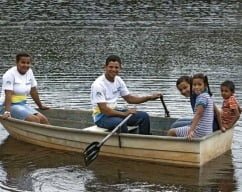Edition 164 – In harmonious and productive waters
In the Southern Bahia Lowlands, people are coming to understand that everyone can contribute to the environmental balance of their habitat
1 de January de 2013
In the Southern Bahia Lowlands, people are coming to understand that everyone can contribute to the environmental balance of their habitat
1 de January de 2013

written by Gabriela Vasconcellos
photos by Almir Bindilatti
Every day when he wakes up and opens the window, Adenilton do Nascimento, 31, looks out on Lake Antônio Rocha. It is his source of income, since he farms fish in its waters. The source of the lake is named after his father, who has lived in that region for over 30 years, and is a prominent figure in the Juliana community, located in Piraí do Norte, in the Southern Bahia Lowlands.

Better known as Deninho, Adenilton is a member and treasurer of the Continental Waters Aquafarmers’ Cooperative (Coopecon). The result of the social mobilization of fish farmers and rural families, Coopecon was founded in 2010, and Deninho was one of the first to join. “The payback is growing every day. Today I make about BRL 1,000 [per month], and I believe I will earn even more, because this is an activity that everybody believes in.”
Therefore, it is the waters of Lake Antônio Rocha that enable the aquafarmer to support his wife and three children, but his work does not end with feeding tilapia. Deninho believes that, like everyone else in the community, he is responsible for keeping the lake clean. He lives near the source, and working in partnership with the Land Conservation Organization (OCT), he has planted a hectare of land with different crops, such as rubber and fruit trees, a method known as the Agroforestry System (SAF). “The SAF is included free of charge, providing a source of income for the family unit. It offsets the use of part of his land to preserve native vegetation,” says Volney Fernandes, the Leader of the OCT’s Cooperative Alliance for Environmental Services.
“We could see that when the land was cleared, there was less water. Thanks to reforestation, were protecting these resources for future generations. I never thought I’d ever do that. I used to hurt the environment and now I’m defending it,” says Deninho. With the OCT’s support, the aquafarmer has also planted an additional hectare with eucalyptus trees. “Growing trees will be very good for us, because instead of cutting down the forest, we can harvest own wood,” he says. “People here didn’t have that kind of awareness,” he adds.
Deninho’s wife, Leandra Santos, trusts her husband’s judgment. “My kids are thinking about following in their father’s footsteps,” she says, clearly pleased, and shares her own dream: building a new home. Deninho is thinking about his children’s future. “I never had a chance to study, but I want to give them a good education, and teach them the importance of living in a community and preserving nature,” he says. His eldest daughter, Yasmin, is in the 5th grade at Youth House State School (CECJ) in Igrapiúna county, Bahia, and is thinking of becoming an aquafarming technician when she grows up. “I encourage Yasmin every single day,” says Deninho.
Strengthening four types of capital
Coopecon, OCT and CECJ are institutions linked to the Development and Integrated Growth Program with Sustainability for the Southern Bahia Lowlands Environmental Protection Areas Mosaic (PDCIS). Supported by the Odebrecht Foundation, in partnership with government agencies, civil society organizations and private institutions, the PDCIS simultaneously works to strengthen four types of capital: productive, through the establishment of strategic cooperative alliances to generate jobs and income; human, represented by educational centers that help groom young entrepreneurs; social, by encouraging the construction of a more just and egalitarian society; and environmental, through activities that prioritize the recovery and conservation of natural resources.
Essentially, the program is based on the premise that development represents the human evolutionary process, and that everyone can contribute to the balance of their natural habitat and thereby enable progress. This is also what Deninho wants. With the help of the Rights and Citizenship Institute (IDC), he has achieved a basic right for his family and community: civil documents. “The IDC organized a project here, and I took the opportunity to get ID cards for my kids. A lot of my neighbors had no papers at all. We all know that an undocumented person is not a citizen,” he argues.
A role model in his community, the aquafarmer is also committed to leading the Association of Small Farmers in the Juliana Region. With the support of the Pratigi Environmental Protection Area (APA) Guardian Association, which, like the IDC, is also part of the PDCIS, Deninho’s association has mobilized the 40 families that live in the Antônio Rocha area. “I want to bring people together to discuss the best things to do,” he says. For Deninho, the important thing is to strengthen the residents’ feeling of belonging, and thereby achieve the Eighth Millennium Goal: developing a global partnership for development. “By joining forces, we will get results like bigger incomes and the conservation of natural resources,” he affirms.
Do you wish to be
a partner in our projects, make
a donation or hire our technical consulting?
Send a message
right now!